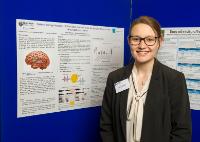2017 Participants
 Sarah McBride
Sarah McBride
Aphasia is a language disorder that often occurs after stroke. Aphasia is also accompanied by short- term memory difficulties, which affect a person’s ability to repeat spoken words and sentences. Some people who appear to have recovered fully from aphasia after stroke, continue to have subtle difficulties with language and short-term memory. This research investigated whether novel speech-timing measures (e.g. preparation time, duration of spoken words and silent pauses) can identify subtle differences between people who have made a full recovery from aphasia. Speech-timing measures taken from a short-term memory task (word repetition) were compared between people with aphasia, and people who made a full recovery from aphasia. Results showed that fully recovered people had longer speech-timing measures, compared to those in the aphasia group. Speech-timing measures can therefore identify subtle differences in people who have made a full recovery from aphasia after stroke.
Funding source: Newcastle University
Supervisor: Christos Salis
